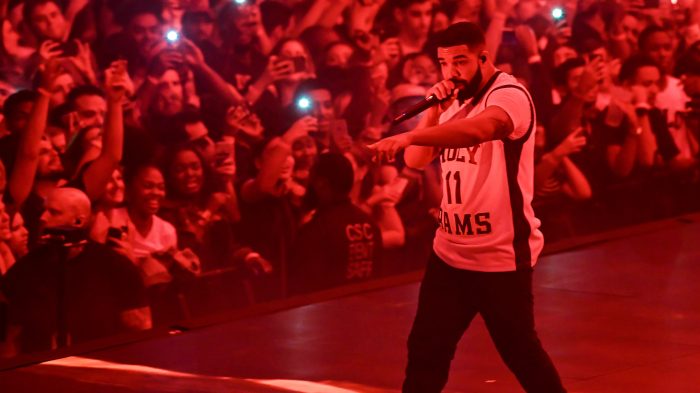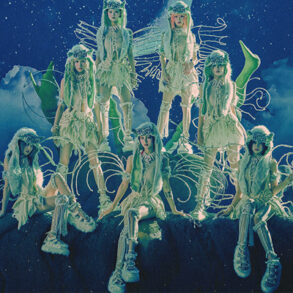On the eve of the release of his latest album, For All the Dogs, Drake took to the stage at his sold-out Miami show. At some point during the night he noticed a fan holding a sign that read, “I spent all my savings buying tickets for me and my ex, but Honestly, Nevermind, it’s really Her Loss.” Drake stopped the show to bring attention to the sign, and asked the fan, “What the f— is wrong with her?” As he does this, the crowd chants “F that b—-.” Drake then said he would give the fan $50,000 “so you gonna flex on her tonight.” He ended the interruption by saying, “f— that young lady.”
This current version of Drake, one that has been brewing over the past couple of years, is an artist at his most regressive and most blatantly misogynistic. On For All the Dogs, we got a Drake who speaks to men with utter disdain for the women they interact with.
It started during the pandemic: Men who I’d considered friends, who had loving relationships, marriages and partnerships — and whom I’d only known to treat women with the utmost respect — gradually changed how they spoke about women. I’d hear phrases like “a woman has to fall back and let a man lead,” or “how do you expect to get a man if you’re overweight,” or “what does a woman bring to the table beyond a good body that she posts on Instagram?”
I’d have debates with these dudes that would turn into arguments, and the length of time between phone calls and hangouts would increase. To a person, they’d tell me they were listening to relationship podcasts — mostly Kevin Samuels, the online personality known for putting down Black woman as part of some faux solidarity with Black men. Samuels, who died in 2022, espoused misogynoir to an audience of men who wanted someone to blame for their discontent in life. Samuels and the podcast offspring he spawned created a vocal community of Black men whose personas were built on their antipathy toward Black women.
I don’t know if Drake was similarly radicalized, but he has honed in on this same audience for the past few years. Let’s be clear: Drake, like much of hip-hop, has always been misogynistic in his music. He’s mostly refrained from the type of b-word slanging that has permeated rap. Instead, he’s positioned himself as the sensitive, nice guy rapper who isn’t like those other disrespectful men. However, Drake has always rapped about going through women’s phones, how women who are too social are a threat to their relationships, and engaged in passive-aggressive barbs at former love interests.

Kyle Gustafson/For The Washington Post via Getty Images
This new Drake, though, is a different, more blatant misogynist. He’s deploying “bitch” way more frequently and aggressively than before. On “Calling for You” he raps, “And I got a chance with the b—/ Loverboy, romance with the b—/ Couldn’t even put my mans on a b—.” He repeats “another late night with my b—” for the hook on “Another Late Night,” as well as stating “he’d f— the ho, so I did it” on “What Would Pluto Do.” These are tropes that just about every popular rapper uses, but it hasn’t been Drake’s M.O. to date. So it’s odd to see an artist embrace this ideology about women so deep into his career when it had previously mostly been absent.
What’s most bizarre is the way Drake has embraced the direct talking points of Samuels’ disciples. Much of the album essentially asks women what they bring to the table — a staple of these podcasters who measure a woman’s worth based on how they serve men — and parrots the ideas that make these relationship shows so harmful … and popular. On “Slime You Out,” a duet with SZA that’s pretty much a toxic dating pod on wax, Drake opens by singing, “I don’t know what’s wrong with you girls / I feel like y’all don’t need love, you need somebody who could micromanage you.” No, he’s not calling women out their names, but he’s demeaning nonetheless.
On For All the Dogs, Drake has delivered the musical equivalent of incel anthems: music for men who can’t get women, or fall short of the women they expect to attain, and who look at Drake as their hero for his ability to woo the women of their dreams. So to hear that Drake wants to discard these women is validation of these men’s insecurities. Because Drake is making music to let these men know it’s OK that they’ve been rejected because women aren’t worth much anyway.
Just look at how he speaks about his former flame, Rihanna. He opens “Fear of Heights” with a series of insults directed at Rihanna that amount to a creed for the community of men with deep disdain for women. He brags about already having sex with Rihanna, calls the sex mediocre, and disses her current relationship with rapper A$AP Rocky. “Gyal can’t run me/ Better him than me/ Better it’s not me/ I’m anti, I’m anti/ Yeah, and the sex was average with you/ …Yeah, I’m anti ’cause I had it with you/ And I had way badder b–s than you, TBH/ Yeah, that man, he still with you, he can’t leave you.” It’s important to mention Drake’s relationship with Rihanna ended years ago — she told Vogue in 2018 they weren’t even friends — and she’s had two children with A$AP Rocky since then. But those lines epitomize the bitter, misogynistic ideologies of the men Drake has chosen to appeal to.
Again, this is a far cry from the Drake who first wrote about his relationship with Rihanna on “Fireworks” in 2010. “Who could’ve predicted Lucky Strike would have you stuck with me … but I was curious / and I’ll never forget it baby, what an experience,” he rapped. At the time, the verse was touted as a mature way to handle a breakup, and an example of Drake’s ability to navigate public relationships with class and respect.
Those days are gone.
In short: Drake has love bombed his audience, especially his female fans, pretending to offer affection only to reveal a more sinister persona when it became time to remove the facade.
Take for instance, his barb at jazz musician Esperanza Spalding for winning a Grammy for best new artist over him more than a decade ago in 2011. “Esperanza Spalding was gettin’ all the praises/ I’m tryna keep it humble/I’m tryna keep it gracious/ Who give a f— Michelle Obama put you on her playlist?/ Then we never hear from you again like you was taken,” he rapped on “Away From Home.” It’s an odd attack on yet another woman for no reason at all.
Unfortunately, Drake doesn’t keep that same energy for his male peers on For All the Dogs. There are plenty of men who insult or have insulted Drake regularly who he could’ve directed his energy toward. Drake spent a few bars addressing Pusha T, the rapper who eviscerated him on diss tracks some years ago. Kendrick Lamar used to insult Drake, too. And Drake is still engaged in a cold war with Kanye West. But those men are mostly spared on the album.
The other detail that makes this all more troubling is that Drake’s real-life interactions are growing increasingly disrespectful and dismissive to women. We can say that Drake is playing a role in these songs, but that doesn’t explain his off-the-wax actions. Besides the $50,000 giveaway at his concert, he hung out with Tory Lanez in public after Lanez had been accused of shooting Megan Thee Stallion. Drake also insinuated that Megan Thee Stallion was lying about being shot on “Circo Loco” in 2022. On that same Her Loss album, Drake called tennis legend Serena Williams’ husband a “groupie.” Even for the rollout of this latest album, Drake offended actress Halle Berry by using a photo of her without her permission (he asked, she said no). Drake can claim that his music is about portraying a character. He can act like he’s in a phase of being a villain or that he’s trolling his targets. But his public, nonmusical life is moving ever closer to the one we hear on his songs.
For All the Dogs is an album from a man with no place to go creatively, so he’s lashing out at the most vulnerable among us. The album will be successful, as all Drake albums are. He will tout the album’s performance on the charts. Fans will use that as a means to prove doubters wrong.
But the rest of us know, just like Drake himself probably knows, that this project is a basement dweller in his catalog. He probably doesn’t care, though. He’ll continue to be embraced by the fans who adore him. It’s just that now, many of those fans look and sound like the men who followed Kevin Samuels.
I’ve been called unfair for asking Drake to grow up as an artist and for stating that though we are the same age, he always seemed to be making music for his 25-year-old self. But he’s not even making songs for mid-20s kids to dance to these days. He’s making music for men who want to lash out at women. And it’s as lazy as it is sophomoric. “Bend a d— like the pope?” “Ho ho hoes still believe in Saint Nick?” “Love is like a BBL?” This is a man who’s traded in a love and care for the craft for a simplistic appeal to men who claim they love women but act and speak otherwise. And it’s diminishing his art.
I’m no longer asking Drake to grow up. Instead, I’d simply like for him to stop regressing. It’s a request I thought I’d never have to make and one that seems more likely to be unfulfilled with each passing album.








